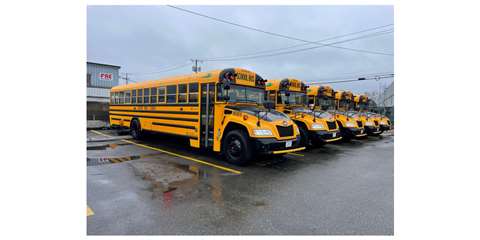Boston Public Schools puts 20 Blue Bird electric buses into service
25 April 2023
 Boston Public Schools has acquired 20 electric school buses from Blue Bird Corporation to transport 2500 students to and from 42 schools. (Photo: Blue Bird)
Boston Public Schools has acquired 20 electric school buses from Blue Bird Corporation to transport 2500 students to and from 42 schools. (Photo: Blue Bird)
Boston Public Schools (BPS) has taken the first step in advancing zero-emission transportation by partnering with Blue Bird Corporation on a pilot program to put 20 electric school buses into service for the city’s students.
The 20 buses will transport 2500 students to and from 42 BPS schools daily, and school and local officials said the program is the largest electric bus deployment in the Northeast.
Boston Mayor Michelle Wu spearheaded the project, which ultimately aims to turn BPS’ entire 750-vehicle fleet to electric by 2030, to significantly reduce harmful greenhouse gas emissions while improving student and community health.
“We are thrilled by this historic partnership,” said BPS Superintendent Mary Skipper. “This pilot program is an important step in our work towards a fully electric fleet by 2030, as part of the Green New Deal for Boston Public Schools. These buses are quieter, cleaner, and are an essential part of reducing BPS’ carbon footprint and creating a healthier city. Putting the needs of our young people first is central to our mission.”
Each Blue Bird Vision electric bus carries a maximum of 71 students for up to 120 miles on a single charge, and the buses charge fully in approximately four hours with BPS’ Level III ICE 30 kW fast-chargers.
Blue Bird, which has more than total 950 electric school buses in operation today, delivered this first batch of electric Blue Bird Vision buses in conjunction with the company’s regional dealer Anderson Blue Bird Bus Sales of New England.
Anderson has worked with BPS for more than a decade to meet student transportation needs and to maintain the school district’s 750-vehicle fleet –approximately 250 of which run on diesel.
“Being on the ground floor with Boston Public Schools, the city of Boston and Transdev, BPS’s maintenance and operations contractor, to initiate this pilot project and see it through to this recent deployment is something special for all our team members that made this a success,” said Jim Anderson, vice president of Anderson Blue Bird Bus Sales of New England. “BPS’s transition from a diesel- to a propane- and now an electric-powered fleet demonstrates the commitment the Boston Public Schools and the city of Boston has undertaken to provide a cleaner, more sustainable environment within the city boundaries: Boston EV Strong.”
“Blue Bird is recognized as a technology leader and innovator of zero-emission school buses in North America,” said Britton Smith, Senior Vice President of Electrification and Chief Strategy Officer for Blue Bird Corporation, which has more than 950 electric-powered school buses in operation today. “We are excited to add 20 electric vehicles to Boston Public Schools’ bus fleet and to further help the school district to put student and community health first.”
BPS said it expects cost-saving opportunities by reducing or eliminating the fuel and maintenance costs tied to traditional diesel-powered vehicles.
According to Blue Bird, select customers reported fuel costs of up to 49 cents per mile for their diesel buses versus an average of 14 cents per mile for electric buses.
“Our students enjoy riding on our new electric buses; they love the quiet drive,” said Jackie Hayes, assistant director of Contract Operations and Fleet for BPS. “We all love that our students, drivers and school staff are not being exposed to any exhaust fumes generated by traditional, diesel-powered buses.”
STAY CONNECTED



Receive the information you need when you need it through our world-leading magazines, newsletters and daily briefings.
CONNECT WITH THE TEAM






